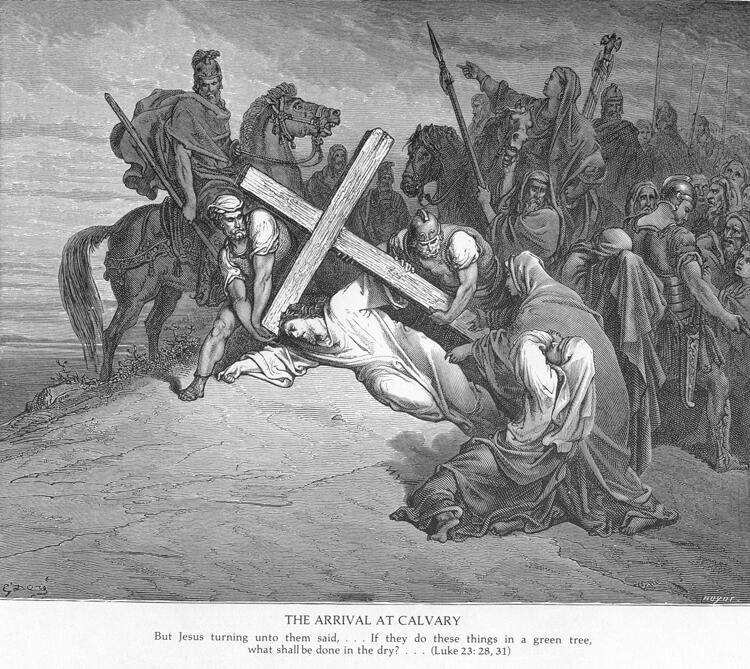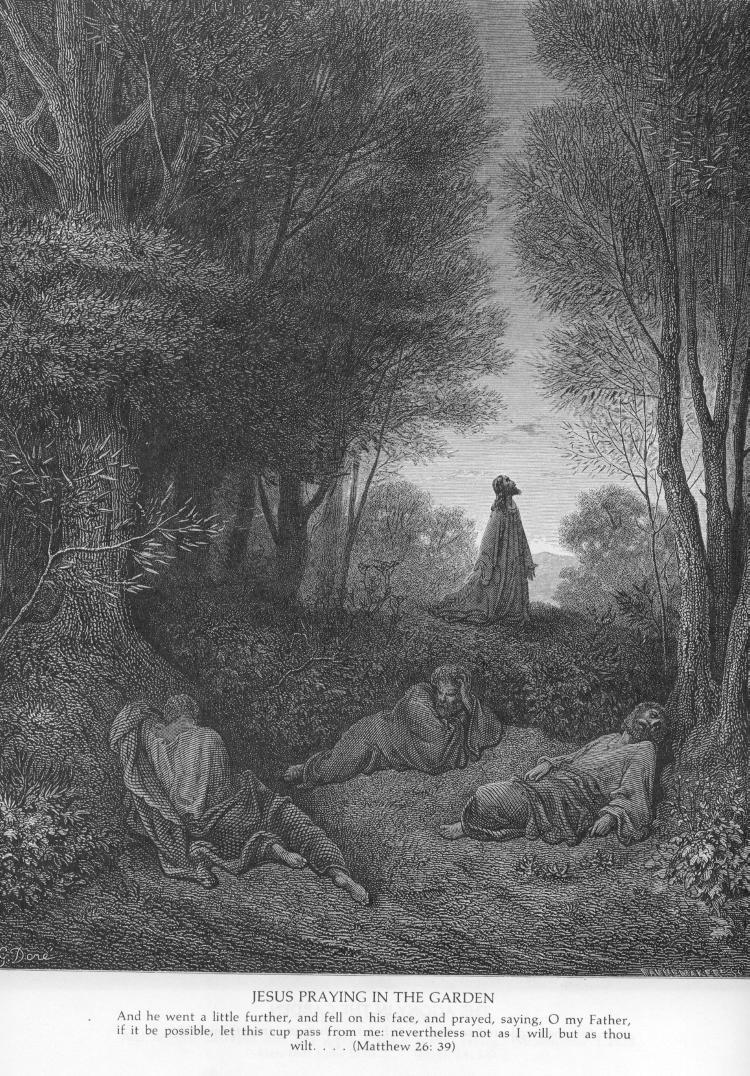MEDULLA S. THOMAE AQUITATIS PER OMNES ANNI LITURGICI DIES DISTRBUITA, SEU MEDITATIONES EX OPERIBUS S. THOMAE DEPROMPTAE
Compilation and organization by
FR. Z. MÉZARD O. P.
NOTE
All titles marked with an asterisk contain material that is no longer attributed to Saint Thomas Aquinas

34. Monday after the First Sunday of the Passion: The Passion of Christ is a remedy against all sins
Monday of the First Week of the Passion
For all the evils that we incur through sin, we find a remedy in the Passion of Christ. We incur five evils through sin:
The first is the very stain of sin. When a man sins, he defiles his soul, because, just as virtue beautifies, sin mars it. It is written in Baruch: "Why are you, O Israel, in the land of your enemies, and are defiled with the dead?" (Bar 3:10).
But the Passion of Christ washed away this stain. Christ, in His Passion, made His blood a bath to wash sinners in: "He washed them from their sins in His blood" (Rev 1:5). In Baptism, the soul is washed in the Blood of Christ, which receives the regenerative power from the Blood of Christ. Therefore, when someone baptized becomes tarnished by sin, he commits an offense against Christ, and his sin is greater than that committed before baptism. It is written in the Letter to the Hebrews: "Anyone who has rejected Moses' law dies without mercy on the testimony of two or three witnesses" (Heb 10:28-29). How much more does he not deserve greater punishments who has trampled the Son of God and considered the blood of the covenant a common thing?
The second evil we incur through sin is becoming an object of God's aversion. Just as the carnal person loves the beauty of the flesh, so God loves spiritual beauty, which is the beauty of the soul. Therefore, when the soul allows itself to be contaminated by the evil of sin, God is offended and hates the sinner. It is written in the Book of Wisdom: "God hates the wicked and his wickedness" (Wis 14:9). But the Passion of Christ removes these things because it satisfied the Father who was offended by sin, which satisfaction could not come from man. The charity and obedience of Christ were greater than the sin and disobedience of the first man.
The third evil is weakness. When a man sins for the first time, he thinks he can abstain from sin afterward. However, the opposite happens: he weakens through the first sin and becomes more inclined to sin. Sin increasingly dominates the man, and he puts himself in such a state that he can no longer rise. It is like someone who has thrown himself into a well. He can only get out by divine power. After man sinned, our nature became weakened, corrupted, and, for that reason, he became more inclined to sin.
But Christ has diminished this weakness and frailty, even if He has not completely eradicated them.
Man was strengthened by the Passion of Christ, and sin, weakened, will no longer dominate him. For this reason, assisted by divine grace, which is conferred through the sacraments whose effectiveness comes from the Passion of Christ, he can strive to emerge from sin. It is written in St. Paul: "Our old man was crucified with Him, that the body of sin might be done away with" (Rom 6:6). Before the Passion of Christ, there were few without mortal sin. But afterward, many have lived and still live without mortal sin.
The fourth evil is the obligation we have to fulfill the penalty for sin. God's justice requires that sin be punished, and the penalty is measured by the guilt. Since the guilt of sin is infinite, as it goes against the infinite good, God, whose command the sinner has despised, the penalty due for mortal sin is also infinite.
But Christ has delivered us from this penalty through His Passion, taking it upon Himself. St. Peter confirms this: "Who Himself bore our sins (i.e., the penalty of sin) in His own body" (1 Pet 2:24).
The virtue of the Passion of Christ was so abundant that it was sufficient to atone for all the sins of all men, even if they numbered in the millions. This is why one who is baptized is also purified from all sins. It is also for this reason that priests forgive sins. Likewise, the one whose suffering most resembles that of the Passion of Christ obtains greater forgiveness and deserves greater graces.
The fifth evil incurred through sin is that we have become exiled from the kingdom of heaven. It is natural that those who offend the king are obliged to leave the homeland. Man was removed from paradise because of sin: Adam was expelled from paradise immediately after sin, and his gate was locked. But Christ, through His Passion, opened that door and again called the exiles back to the kingdom. When the side of Christ was opened, the door of paradise was also opened; when His Blood was shed, the stain was erased, God was appeased, weakness was removed, the penalty was expiated, and the exiles were summoned to the kingdom. This is why it was said immediately to the thief: "You will be with Me today in Paradise" (Luke 23:43). Notice that at that moment it was not said—formerly; nor was it said to anyone else—neither to Adam, nor to Abraham, nor to David; it was said, today, that is, as soon as the door was opened, and the thief asked and received forgiveness. It is written in the Letter to the Hebrews: "Having confidence to enter the Most Holy Place by the blood of Jesus" (Heb 10:19). Thus, it is clarified how the Passion of Christ was useful as a remedy against sin.
In Symb.
(P. D. Mézard, O. P., Meditationes ex Operibus S. Thomae.)
#God #Deus #Isten #Gott #Jesus #Católico #Catholic #Katholik #katholisch #Katolikus #catholique #Faith #Fé #foi #信仰 #Latin #Latim #Gospel #Evangelho #Evangélium #évangile #Dieu #福音 #日本 #カトリック #Bible #Biblestr #Nostr #Grownostr
quotingTitle of the work in Latin
nevent1q…utaz
MEDULLA S. THOMAE AQUITATIS PER OMNES ANNI LITURGICI DIES DISTRBUITA, SEU MEDITATIONES EX OPERIBUS S. THOMAE DEPROMPTAE
Compilation and arrangement by
FR. Z. MÉZARD O. P.
NOTE
All titles with an asterisk contain material that is no longer attributed to Saint Thomas Aquinas.

33. First Sunday of the Passion: The Passion of Christ
First Sunday of the Passion
"And as Moses lifted up the serpent in the wilderness, even so must the Son of Man be lifted up, that whoever believes in Him should have eternal life." (John 3:14-15)
Here there are three things we should consider:
1. The figure of the Passion: "And as Moses lifted up the serpent in the wilderness." To the Jewish people, who said, "Our soul loathes this worthless bread" (Num 21:5), God sent serpents as a punishment. Then He commanded them to make a bronze serpent as a remedy against the serpents and in figure of the Passion. It is characteristic of a serpent to have venom, but the bronze serpent was not poisonous. Similarly, Christ had no sin, which is a poison, but He resembled the sinner, according to this word of Saint Paul: "God sent His Son in the likeness of sinful flesh" (Rom 8:3). Therefore, Christ produced the effect of the bronze serpent against the onslaught of burning desires.
2. The manner of the Passion: "It is necessary that the Son of Man be lifted up," which is understood from the lifting up of the cross. Christ wanted to die lifted up:
a) To purify heaven. By the holiness of His life, He had already purified the earth; it remained to purify the air.
b) To triumph over the demon, who prepares war in the air.
c) To draw our hearts to Himself: "And I, if I am lifted up from the earth, will draw all people to Myself" (John 12:32).
By dying on the Cross, He was exalted, for He triumphed over His enemies, to the point that His death is called exaltation. The Psalm says: "He shall drink from the brook by the way; therefore, He shall lift up the head" (Ps 109).
And it was the cross that was the cause of His exaltation, as Saint Paul says: "He humbled Himself and became obedient to the point of death, even death on a cross. Therefore God also has highly exalted Him" (Phil 2:8).
3. The fruit of the Passion. The fruit is eternal life. Therefore it says: that whoever believes in Him and does good works shall not perish but have eternal life." This fruit corresponds to the figurative fruit of the bronze serpent. Indeed, whoever turned to it was healed of the poison and saved his life. One turns to the Son of Man exalted on the cross who believes in Christ crucified and, thus, being healed of the poison and sin, preserves himself for eternal life.
In Joan, III
(P. D. Mézard, O. P., Meditationes ex Operibus S. Thomae.)
#God #Deus #Isten #Gott #Jesus #Católico #Catholic #Katholik #katholisch #Katolikus #catholique #Faith #Fé #foi #信仰 #Latin #Latim #Gospel #Evangelho #Evangélium #évangile #Dieu #福音 #日本 #カトリック #Bible #Biblestr #Nostr #Grownostr
nevent1q…cz8l
